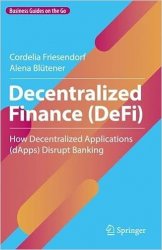Decentralized Finance (DeFi): How Decentralized Applications
- Добавил: literator
- Дата: 4-09-2023, 03:38
- Комментариев: 0
 Название: Decentralized Finance (DeFi): How Decentralized Applications
Название: Decentralized Finance (DeFi): How Decentralized ApplicationsАвтор: Cordelia Friesendorf, Alena Blütener
Издательство: Springer
Год: 2023
Страниц: 116
Язык: английский
Формат: pdf (true), epub
Размер: 12.7 MB
This book explores how decentralized finance (DeFi) can disrupt traditional centralized finance including the business areas of insurance companies, banks, money markets, and bonds. DeFi is not a company or a single product, rather it is a collection of products or services. As part of the Ethereum ecosystem, DeFi services are provided as Decentralized Applications (dApps), which require smart contracts to lock in assets for processing transactions. Changing consumer expectations, the availability of affordable technologies, and entrepreneurial drive create space for DeFi. Geopolitical crises and trust deterioration exacerbate the need. This book explains the concept of DeFi, the technological opportunities, the current reality and status quo of business transactions, and demonstrates the potential for future use and the eventual transformation of the financial industry. It further provides a comprehensive analysis of the real-world applications of DeFi, the Decentralized Ledger Technology (DLT), and digital assets, as well as their potential risks to consumers and financial institutions to bankers, managers, investors, and policymakers.
A blockchain is a digital ledger that is a record of multiple transactions that are shared, replicated, and distributed among a large network of nodes in order to keep track of each other. The blocks that make up the blockchain all store a different volume of transactions, and for every new transaction that is processed on the blockchain, a record of that transaction will be added to the ledger as it is recorded in the blockchain. The technology behind blockchain is widely recognized as being at the heart of many cryptocurrencies such as bitcoin or ether. In its original form, a blockchain was intended to be a distributed and open ledger that efficiently records the transaction between two parties in a way that makes it permanent and verifiable. This will make it harder for external parties to exploit, cheat, hack, or change the system in any way. The hacker would have to change every single block across all of the distributed ledgers if they were interested in altering one of the blocks in the chain as a result of tampering with the system. The effect of this would be that he would need to change every single block in the chain, which is bound to attract attention and thereby prevent system abuse or even financial crime.
Currently, Bitcoin and Ethereum are the two most prominent blockchains. Despite this, blockchain technology has more potential than just recording cryptocurrency transactions. Over the past few years, a new cryptographic asset called non-fungible tokens (NFTs) has been introduced on the blockchain. A unique set of metadata and identification codes is associated with NFTs. Due to this, they can be distinguished from one another. NFTs cannot be traded or exchanged for an equivalent asset, unlike other crypto assets such as bitcoin. In video games, for example, they can be used as art pieces and collectibles. The investment can, however, also be viewed as speculative in nature.
Contents:
Скачать Decentralized Finance (DeFi): How Decentralized Applications
Внимание
Уважаемый посетитель, Вы зашли на сайт как незарегистрированный пользователь.
Мы рекомендуем Вам зарегистрироваться либо войти на сайт под своим именем.
Уважаемый посетитель, Вы зашли на сайт как незарегистрированный пользователь.
Мы рекомендуем Вам зарегистрироваться либо войти на сайт под своим именем.
Информация
Посетители, находящиеся в группе Гости, не могут оставлять комментарии к данной публикации.
Посетители, находящиеся в группе Гости, не могут оставлять комментарии к данной публикации.

